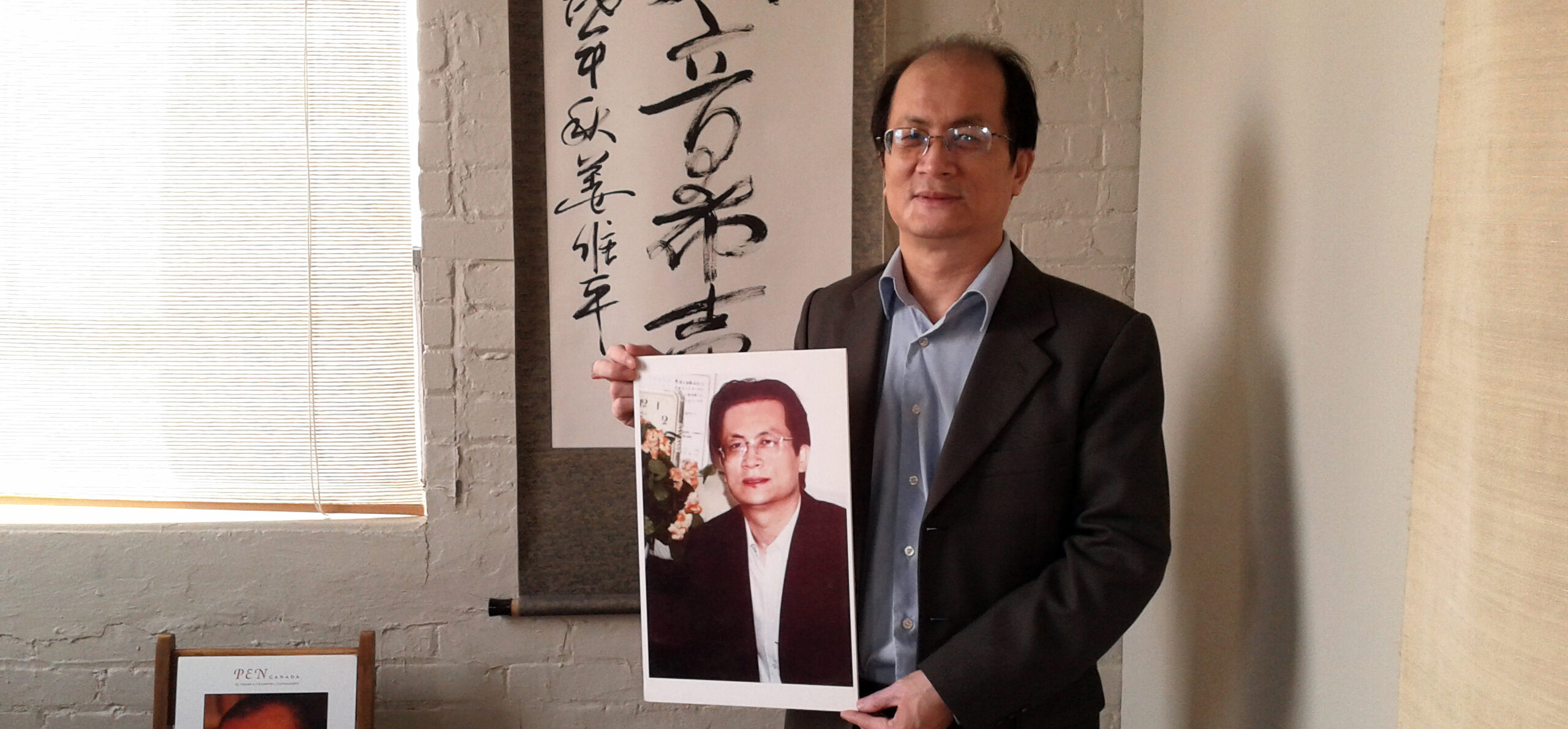One Humanity Award

Photo taken in 2012, a free Jiang Weiping holds his own PEN Empty Chair poster. The poster was used by PEN Canada while advocating for his freedom when he was imprisoned. Photo by PEN Canada.
“Undoubtedly, the climax of the year for the Writers in Prison Committee came in early February, when Jiang Weiping… stepped down from the airplane at Toronto airport…Now he had gained release and, with PEN at his back, been reunited with his family who had come on ahead of him. At that moment we all could feel, well, joyful and justified.”
The following report was originally published in the 2008/2009 PEN Canada annual report, My PEN. It was written by Alan Cumyn, former Chair of the Writers in Prison Committee, PEN Canada.
Alan Cumyn on the campaign to free dissident Chinese writer, Jiang Weiping
Jiang Weiping, the imprisoned Chinese journalist, first came to my attention in 2003.
It was the end of a long phone conversation with PEN Canada’s Executive Director Isobel Harry in which we had, as usual, talked about a variety of cases and issues. She told me she had met an extraordinary woman, Stella Lee, whose husband had been thrown in jail as a result of a series of articles he’d written exposing political corruption in northeastern China. Two of the politicians he had written about had gone to jail – one was even executed for his crimes – but others had simply been angered, and in China’s notoriously warped judicial system, Weiping was now suffering the consequences of having made dangerous enemies. It was a case like so many others in the thickening International PEN list: writers in too many countries persecuted for what they had written.
But Jiang Weiping also had a formidable ally in his wife. Stella Lee was a professional tranlator with strong communication skills and the steely will to fi ght hard on her husband’s behalf over the long haul. Isobel suggested we nominate Jiang Weiping as an Honorary Member, and when I took the idea to the Board they readily agreed. We just had no idea how long a haul it was going to be.
Weiping had already been in prison for three years and was suffering from rheumatic arthritis and atrophic gastritis, serious conditions made worse over the years since Stella had stopped being able to smuggle medicines to him in prison. Stella herself had lost her job as a result of her husband’s arrest and later was also briefl y detained. Perhaps the hardest decision of her life was to seek refuge in Canada with their daughter Jennifer and thus try to free her husband from a distance rather than staying to fi ght the battle in China.
One of PEN Canada’s first efforts on behalf of Jiang was to assist American PEN in delivering the $5,000 US from his prestigious Hellman/Hammett award to Stella and Jennifer to help them settle in Toronto. Jiang was quickly the focus of a PEN Canada newsletter and our advocacy also helped see him featured at World Press Freedom Day events in Ottawa and Toronto in May 2004. Later in the year we met with offi cials from the Human Rights Division of Foreign Affairs in Ottawa to ensure that Jiang Weiping’s name and case information were on a crucial list of prisoners of concern that Prime Minister Paul Martin would take to Chinese leaders on his upcoming trip to China. Those prisoner lists had often proved important negotiating tools in the past as the Chinese government periodically released prominent dissidents for “other considerations” in their on-going diplomatic chess game with the West.
But the Chinese government’s stance concerning prisoners of conscience hardened in those middle years of Jiang’s incarceration. We were not the only organization reporting difficulties getting the Chinese to budge on cases of concern, and Canadian Foreign Affairs officials privately expressed frustration and dismay at the situation. By May of 2005 Jiang was featured as the Empty Chair at the National Press Club’s World Press Freedom Day event in Ottawa, and his prison conditions and health were seriously deteriorating. We decided to try a backdoor approach and used a Foreign Affairs contact of former Writers in Prison Committee chair Charlie Foran’s to request a high-level meeting between Foreign Affairs representatives, PEN, and Stella Lee, and also to secure a meeting with Governor General Adrienne Clarkson and His Excellency John Ralston Saul. The plan was to get Canadian and Chinese officials at the highest level talking with each other about Jiang Weiping. No one could be more persuasive than Stella, and perhaps nowhere are personal connections more important than in China.
By August 2005 the backdoor, high-level approach was yielding positive results. Jiang’s brother and sister-in-law were allowed to visit for the first time in ages and in civilized circumstances: over lunch and not with thick glass separating them. Jiang seemed in good spirits though he was obviously suffering from gastritis. He hoped for release early in the new year. PEN Canada continued to work behind-the-scenes at Foreign Affairs to make sure Jiang’s sponsored refugee application would be in place so that he could come to Canada quickly once the opportunity arose. As hoped, Jiang was released in January 2006 having served a six-year sentence. PEN Canada did not comment publicly because intense negotiations were still going on to lobby the Chinese government to allow Jiang to join his family in Canada immediately.
Jiang quickly contacted the Canadian embassy in Beijing but was unable to obtain a passport from his own country. He was still facing the three years of “deprivation of political rights” that was part of his original sentence. Privately, Canadian government officials voiced ongoing frustration over the stalemate. PEN Canada’s difficult decision was whether to continue trying the quiet, backdoor approach which now appeared to be faltering or to further publicize the case and thus risk antagonizing Chinese officials who might indefinitely block Jiang’s access to a passport.
MP Jason Kenney, Prime Minister Stephen Harper’s parliamentary secretary who had often worked to further human rights in China, maintained a strong interest in Jiang’s case, but as the months went by it became clear that China’s position had hardened. In August 2006 Isobel Harry and I discussed the possibility of introducing a human rights prize, the One Humanity Award, which might give the Chinese government a face-saving excuse to grant Jiang a passport to travel to Toronto. Both the Board and the Canadian government were enthusiastic and Jiang was a unanimous choice as fi rst recipient of the award, which grants up to $5,000 to honour a writer, journalist, academic or PEN Canada Honorary Member outside of Canada whose work has transcended the boundaries of national divides and inspired connections across cultures. The award caused a stir but the Chinese government’s hard line remained. Jiang’s purgatory was being played out amidst other contentious cases, including that of imprisoned Canadian Huseyin Celil, which were straining Chinese-Canadian relations. We feared that further publicizing Jiang’s case might result in a backlash against him; re-arrest seemed a strong possibility even though he was maintaining a low profile.
Finally it appears that the clock, and all those hard-won connections, worked in our favour. When the restrictions on Jiang’s political rights were lifted at last in February 2009, the years of lobbying, letter-writing, phone calls, emails and meetings finally paid off. PEN Canada was able to work swiftly and quietly with Canadian government officials to bring Jiang to Toronto to reunite with his family – the resolution we all worked for. What a delight to get the unexpected email after such struggle and frustration: “Jiang Weiping left Beijing at dawn this morning, and should be in Toronto by midnight.”
Subscribe for updates about PEN Canada’s work to defend free expression.
